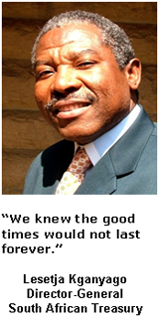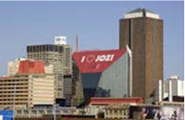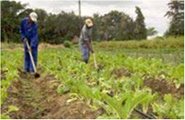 ReConnect Africa is a unique website and online magazine for the African professional in the Diaspora. Packed with
essential information about careers, business and jobs, ReConnect Africa keeps you connected to the best of Africa.
ReConnect Africa is a unique website and online magazine for the African professional in the Diaspora. Packed with
essential information about careers, business and jobs, ReConnect Africa keeps you connected to the best of Africa.


 South Africa’s Director-General of the Treasury shares his views on how South Africa has planned for and is weathering the economic downturn.
South Africa’s Director-General of the Treasury shares his views on how South Africa has planned for and is weathering the economic downturn.
"The South African economy is holding up well during the storm, but the storm is more ferocious than we expected," said Lesetja Kganyago, Director-General of the South African Treasury at a recent briefing in London organised by the Global South Africans initiative.
Hosted by Deutsche Bank, the meeting was convened by the Global SA Network in conjunction with the South African Business Club during Kganyago’s three-nation tour briefing investors on South Africa’s Medium Term Budget Policy Statement.
In his briefing, the Director-General noted that these were extraordinary times in the global economy and that, for the first time, and as an indicator of the volatility of the current markets, the IMF had revised their economic forecast three times in one month.
"The global economic environment is a forecasting nightmare," he remarked, "with all your assumptions being thrown out of the window." In the past, he said, there had been financial crises and banking crises but, on this occasion, the financial system had run ahead of itself resulting in a freezing of credit market and interbank lending. This, in turn, has led to an economic crisis which puts pressure on investors to withdraw from certain countries.
Whereas in the past global economic and financial crises have emerged from developing countries, said Kganyago, this was the first time that a global financial and economic crisis had originated in the industrialized countries.
What started as a sub-prime crisis has resulted in a global financial and economic crisis which demonstrates the degree to which the world is interconnected and interdependent. Despite what some analysts suggest, he said, emerging markets have been affected by the crisis and it is not viable to decouple the emerging markets – which make up 40% of the world economy – from the broader global economy.
"This time, it’s a different ballgame," he explained, and the flight to quality which was now underway suggested that "we will be in this for the long haul."
Lesetja Kganyago has been Director-General of the National Treasury since January 2004. His primary responsibilities include managing the department; producing a sound and sustainable national budget; managing government’s financial assets and liabilities; overseeing government accounting policies and standards; regulating public sector procurement through policy formulation; developing appropriate fiscal policy and financial management and improving financial management throughout government.
Kganyago has been the recipient of several prestigious awards including the Helen Suzman Leadership Award granted by The British Council in 1993 and the International Financing Review (IFR) deal of the year awards for the South African government's Yankee bond in 1997 and the South African government's Eurobond in 1999.
"South Africa’s response to this crisis started two years ago with the acknowledgement that the good times would not last forever," said the Director-General.
"It was clear that dark clouds were gathering and the storm was coming, but we did not know when it would arrive." As the country considered how it would cope if the flow of funds to the developing world were to stop and where it would want to be after the storm passed, said Kganyago, there was a need to "build the windmills before the storm comes."
"It was clear that dark clouds were gathering and the storm was coming, but we did not know when it would arrive."
South African President Kgalema Motlanthe echoed this view when, addressing the 13th annual National Economic Development and Labour Council (Nedlac) in Pretoria in December, he pointed out that the latest growth figures for the country's economy indicated a tough road ahead.
"Whereas our economy had maintained a growth rate of close to three percent per annum, in per capita terms, from 2004 until early this year, the recent results show that we have entered difficult times," he said. "The last quarter has registered a growth rate of 0.26%, which indicates that our growth prospects are taking a dive."
 The President also noted that unemployment in the country was still unacceptably high, and that the gap between the rich and poor had widened. Even before the crisis broke, South Africa's unemployment rate had already started to rise from 23.1% in the second quarter of 2008 to 23.2% in the third quarter.
The President also noted that unemployment in the country was still unacceptably high, and that the gap between the rich and poor had widened. Even before the crisis broke, South Africa's unemployment rate had already started to rise from 23.1% in the second quarter of 2008 to 23.2% in the third quarter.
South Africa has enjoyed the longest economic upturn ever over the past decade or so but growth has not been balanced, said Kganyago. Demand had outstripped production, a situation that has been particularly evident in the electricity sector and with infrastructure such as ports and roads.
This internal imbalance led to capacity constraints and the subsequent introduction of the country’s accelerated growth program (ASGISA) to raise the levels of investment and savings. In 2004, investment represented 15% of GDP whereas currently it represents 22% of GDP. On balance, said the Director-General during his briefing, "we are in a much better position than many developing countries due to steps taken to mitigate the risks."
The impact of the downturn of GDP had been felt and there has been a downward pressure on inflation, noted Kganyago. Food and commodity prices have come down and by mid 2009 the South African economy should be back within the 3% -6% target range for inflation. Although the current prediction for growth in 2008 was 3%, this would need to be reviewed again in 2009 – a year in which growth is now projected at 1.9%.
 The tightening of credit through the National Credit Act has also played an important role in preparing South Africa for the storm, said Kganyago. Thanks to the National Credit Act the interbank system was working well and the bond market was still open.
The tightening of credit through the National Credit Act has also played an important role in preparing South Africa for the storm, said Kganyago. Thanks to the National Credit Act the interbank system was working well and the bond market was still open.
According to the Director-General, what is needed now is a "balance between fiscal and monetary solutions". Eskom was a good example of where government had come forward with R60 billion over five and subsequently three years to meet part of its required R342 billion expansion program over the next five years. The rest will need to be financed by increased tariffs, export credits and raising finance in international capital markets. The African Development Bank has also come forward with a loan of R8 billion.
South Africa has been affected by the global crisis in three ways, said the Director-General.
Firstly, the current account deficit had increased due to capital outflows from South Africa in the first few months. Something had to give and the exchange rate has been allowed to be the escape valve in order to stabilise the economy.
Secondly, there has been a slow-down of South African exports, particularly commodities such as platinum, gold, steel and palladium. On the upside, the country was paying much less for its oil imports.
Thirdly, South Africa has fared well with the financial crisis thanks to a tightly-regulated financial sector where the National Credit Act had "protected banks against themselves." If it was not for the NCA, interest rates would have been much higher, he said.
The Director-General added that the current situation required that the treasury was "brutally efficient". The role of the Reserve Bank is to protect the currency through an independent monetary policy while the Treasury’s role is to ensure growth and development.
The country had done a lot to attract FDI with limited success so far. One of the quickest approvals recently was the investment by Heineken which was because a top-level government team had been assigned to ensure that all the necessary approvals were approved and went through.
"We are in a much better position than many developing countries due to steps taken to mitigate the risks."
"The department of trade and industry will have to mainly be a team of account managers who can speed up investment in South Africa," he said.
Asked whether the current global financial and economic crisis – and its implications for the status of capitalism - would embolden the left and those advocating populist policies, Kganyago said:
"This is not the time to experiment with policies that have failed elsewhere. You need to stay your course in the middle of a storm. The big benefit of the recall of President Mbeki is that it forced the new administration to take charge. It forced the new President to say that there will be continuity of policy."
Kganyago said that would not stop Cosatu and the SACP saying that policy would change and create expectations that in order to cut interest rates you need to change inflation targeting.
"But then you are on a path to nowhere," he said.
"We are in this crisis not because of over-regulation but because of a lack of effective regulation,” the Director-General said. "What is crucial is to reduce the burden of regulation."
He pointed out that the marginal tax rate had come down from 48% to 40% in the past 14 years, a reduction which had led to increased collections because companies made more profit and therefore paid more tax.
He added that macro-economic policy would continue to be contested but was basically sound. There needed to be movement in the micro-economic policies, he said.
Kganyago noted that in 1993, Cyril Rampahosa, had said that a democratic South Africa would not honour the apartheid government’s debt. The government had, however, honoured the apartheid debt because a failure to do so would have had disastrous consequences for the country’s reputation and its standing in the global economy.
Kganyago said that he had embarked on four years of study in London in the early 1990’s to make out a credible case as to why South Africa should not repay apartheid debt. But, by the end of four years, he had reversed his position.
In the face of the current economic climate, he said, "there is no room for policy error."
Photos: Chris Kirchhoff, www.MediaClubSouthAfrica.com
